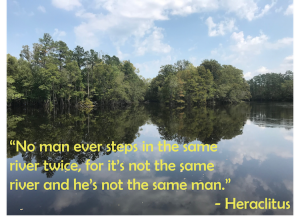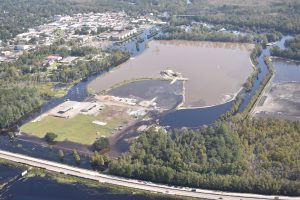The Changing Nature of Our Waccamaw River

By Cara Schildknecht, Waccamaw Riverkeeper
On the Waccamaw, we know the ancient Greek philosopher Heraclitus was right when he said a river is never the same twice. The river that begins as barely a trickle meandering through swamps in North Carolina is not the same river that winds around Conway is still not the same river that widens and fills old rice fields before entering Winyah Bay. While the river changes, so do we. As humans, we have also changed our environment. We have channelized our streams and swamps, filled wetlands, and built our civilizations around rivers. Our river is never the same twice and part of that is due to our actions.
The changing nature of our river leads to different challenges and issues along the river as it flows south. Because of this, we often see the river as a different river in each of our own communities. As the Waccamaw Riverkeeper, I get to experience the entire stretch of our ever-changing river and work on a variety of issues that threaten the health of the Waccamaw.
In North Carolina, our river starts as swamps feeding Lake Waccamaw and the main stem as it builds momentum towards South Carolina. Surrounding those swamps are industrial hog and chicken farms. The rural area makes a prime location for large concentrated animal feeding operations (CAFOs) which create large amounts of waste. More often than we’d like to admit, that waste can enter our waterways causing bacteria contamination, nutrient loading, and subsequent water quality issues. Much of our work in those stretches of the river focuses on CAFOs and how we can hold polluters accountable for damaging our river.

In Horry County, our river flows through the Waccamaw River Heritage Preserve and then through the River Town of Conway. Until very recently, a major threat sat on the banks of the Waccamaw in Conway. The Grainger coal ash ponds were a major concern during every flood event. As the waters rose, the dikes of ponds were the only thing between devastating coal ash pollution and our river. Coal ash contains contaminants with the potential to impact the health of plants, animals, and humans in the watershed. After years of work, all the coal ash has finally been removed from the ponds. We can breathe a huge sigh of relief this hurricane season without a major pollutant looming along our riverbanks.
In Georgetown County, our river widens and expands to fill swamps and old rice fields. With each King Tide, hurricane, and heavy rain, Georgetown goes on high alert. The ocean’s impact on the river at Winyah Bay is recognized throughout the area. Nuisance flooding has become a term all too familiar to anyone in Georgetown. As the ocean levels rise and salt water reaches further upstream, we see changing ecosystems and increased flooding. At the southern terminus of the Waccamaw, climate change is a reality.
The river changes as it flows from the swamps above Lake Waccamaw in North Carolina to Winyah Bay in South Carolina. While the Waccamaw may not be the same river for all of us, we all realize the importance of the Waccamaw in our own lives. As the river changes – over space and time – so does the work of the Waccamaw Riverkeeper and Winyah Rivers Alliance.

If you have questions or issues with water quality in your community, e-mail me at riverkeeper@winyahrivers.org or call 843-349-4007.
